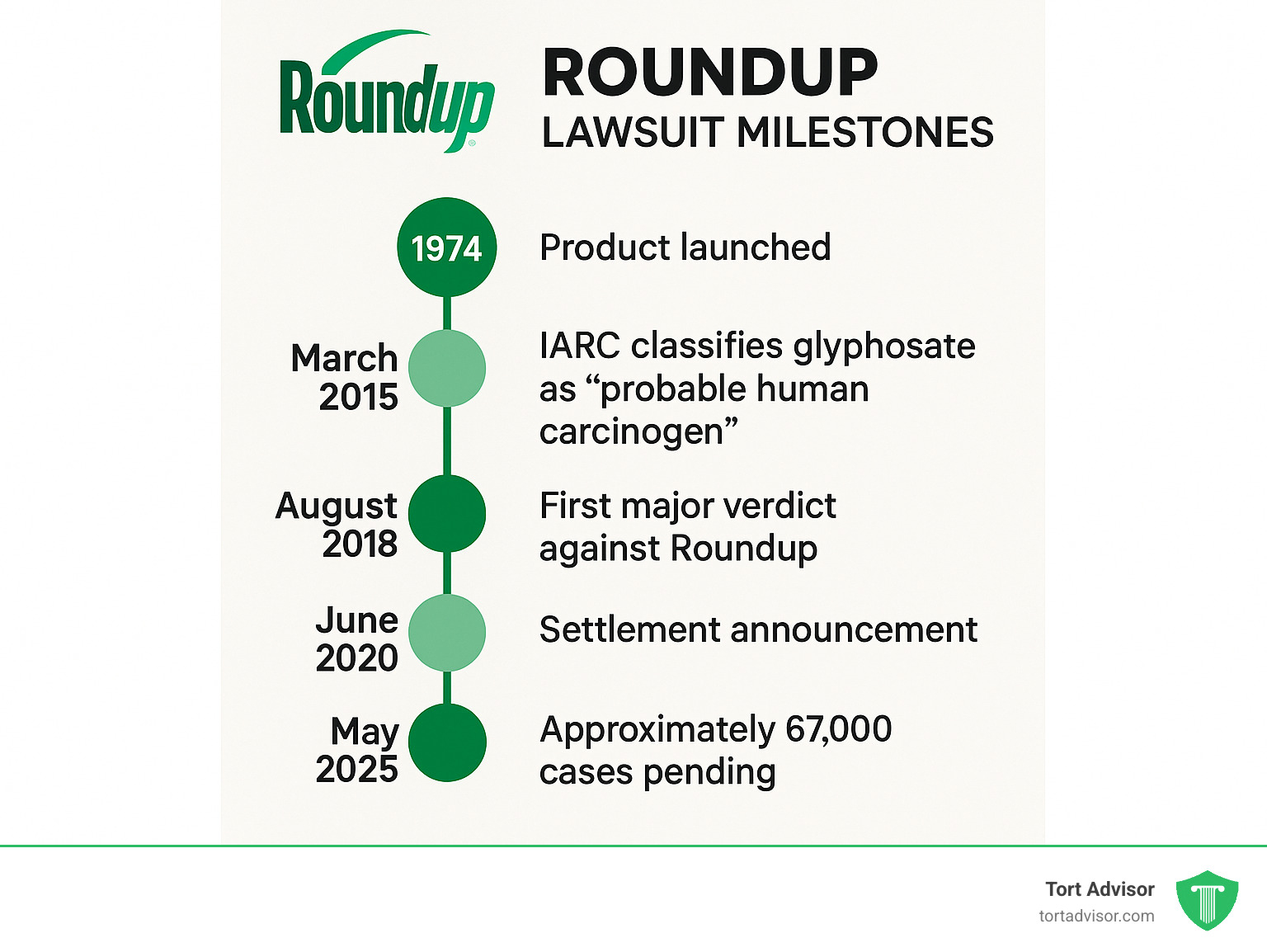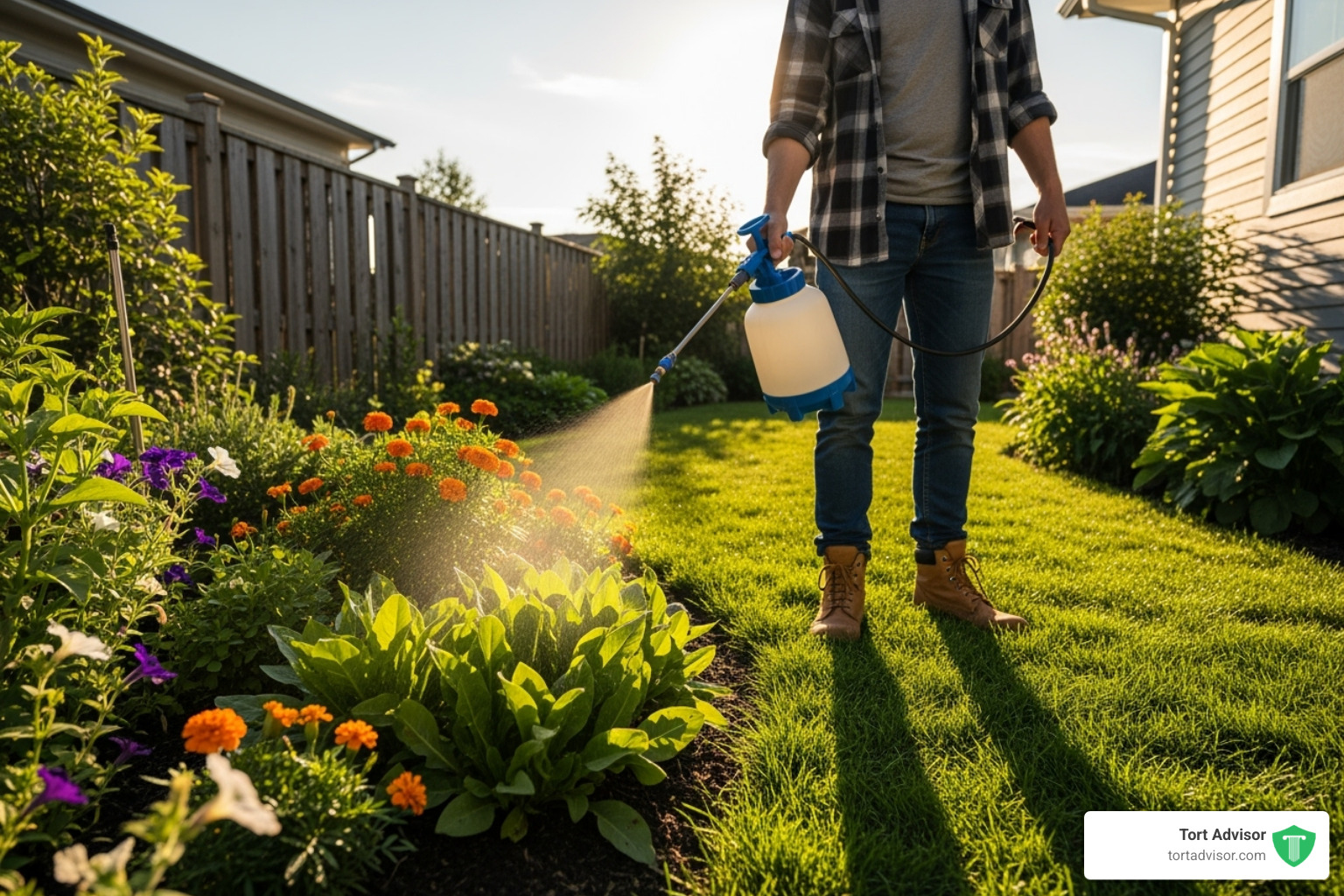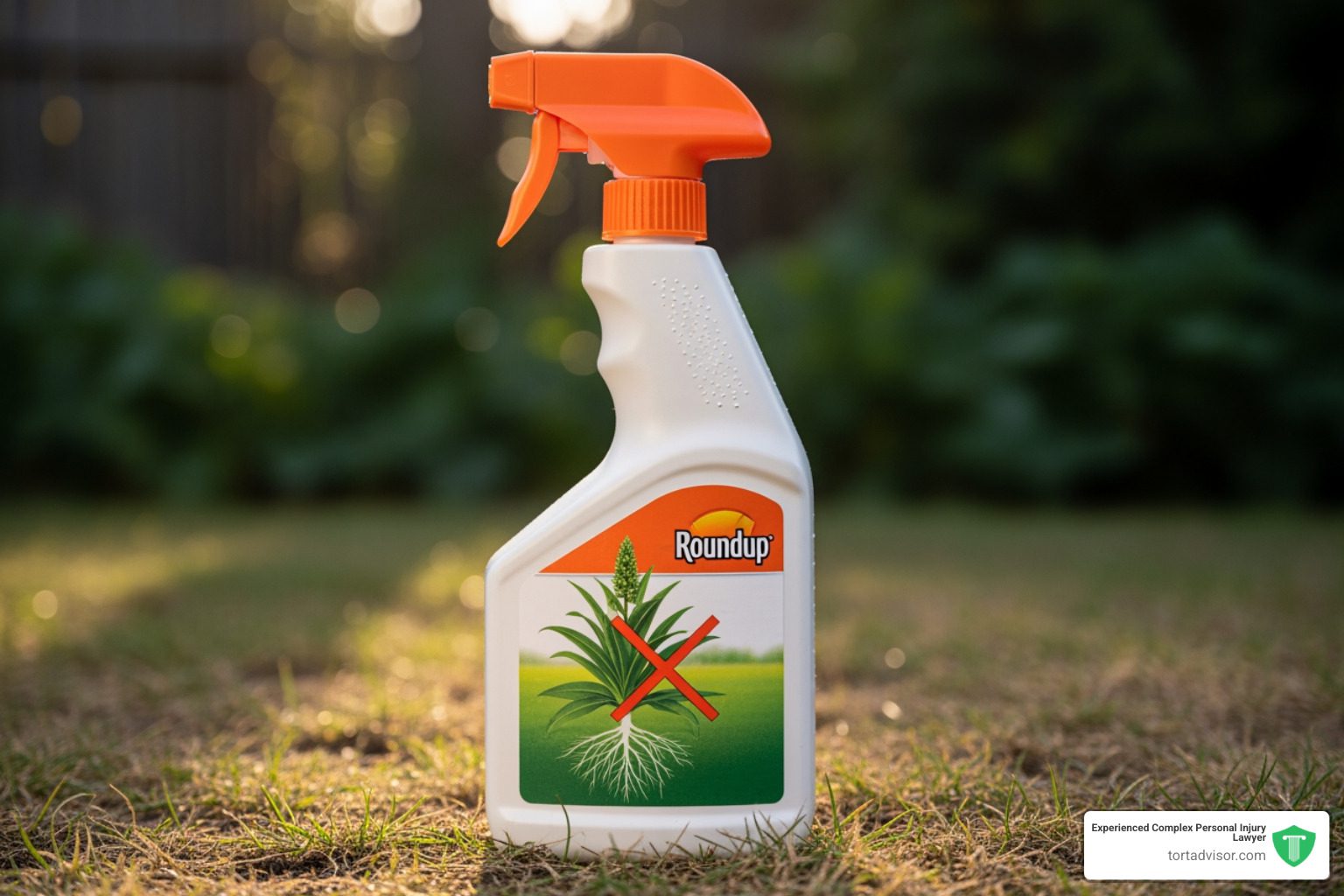


The Roundup Controversy Unpacked
The class action lawsuit against roundup represents one of the largest mass tort litigations in history, with thousands of individuals claiming the popular weed killer caused their cancer diagnoses.
Quick Facts About Roundup Lawsuits:
- Current Status: Approximately 67,000 active lawsuits remain pending as of May 2025
- Settlement Amount: Bayer has paid approximately $11 billion to settle nearly 100,000 cases
- Main Health Concern: Non-Hodgkin’s Lymphoma linked to glyphosate exposure
- Recent Verdicts: $2.1 billion awarded in Georgia (March 2025), $2.25 billion in Pennsylvania (January 2024)
- Canadian Class Action: Certified December 8, 2023, with opt-out deadline of July 17, 2025
- Eligibility: Those diagnosed with Non-Hodgkin’s Lymphoma after “significant exposure” to Roundup
The controversy centers on glyphosate, Roundup’s active ingredient, which the World Health Organization’s International Agency for Research on Cancer classified as a “probable human carcinogen” in 2015. Despite this, the EPA maintains that glyphosate is safe when used as directed.
Bayer, which acquired Monsanto in 2018, inherited these massive legal liabilities. The company is accused of failing to warn consumers about cancer risks and using deceptive marketing practices. Internal documents known as the “Monsanto Papers” allegedly revealed corporate efforts to influence scientific studies and downplay health concerns.
The stakes are enormous, with recent jury verdicts reaching billions, though they are often reduced on appeal. Agricultural workers, landscapers, and home gardeners diagnosed with lymphoma after regular Roundup use form the core of the plaintiffs.
I’m Mason Arnao. My work with large-scale legal and health data systems has allowed me to track the evolution of the class action lawsuit against roundup. This data management background provides unique insights into how these litigations develop and resolve.
Important class action lawsuit against roundup terms:
- average monsanto settlement
- roundup settlement payout
- when will i get my roundup settlement check
The Scientific and Legal Basis: Why is Roundup Being Sued?
The class action lawsuit against roundup is rooted in serious health concerns and claims that Monsanto intentionally hid cancer risks from the public.
The Health Risks: Glyphosate’s Link to Cancer
The controversy escalated in 2015 when the World Health Organization’s International Agency for Research on Cancer (IARC) classified glyphosate as a “probable human carcinogen”. Supporting this, a major University of Washington study found that high glyphosate exposure led to a 41% higher risk of developing Non-Hodgkin’s Lymphoma.
Non-Hodgkin’s Lymphoma is the cancer most commonly linked to Roundup, but some studies also suggest connections to leukemia and other blood cancers. Scientists believe glyphosate may damage DNA or disrupt gut bacteria, potentially leading to cancer. However, the EPA maintains that glyphosate is safe when used as directed, creating a conflicting assessment that has become a key battleground in court.
The Allegations Against Monsanto and Bayer
The legal case alleges Monsanto chose profits over public health. The main claims in the class action lawsuit against roundup center on failure to warn consumers about potential cancer risks and misrepresentation of product safety. Lawsuits allege Monsanto marketed Roundup as harmless while knowing of potential dangers, even claiming it targets enzymes “not found in people or pets.”
The most damaging evidence comes from internal documents known as “The Monsanto Papers.” These leaked files allegedly show corporate ghostwriting of scientific articles and efforts to discredit independent scientists, suggesting a pattern of deceptive marketing. For those who trusted Roundup’s safety, these revelations are a betrayal, and the courts must now determine Bayer’s accountability.
Navigating the Roundup Litigation Landscape
Understanding the complex legal framework is crucial for anyone affected. This section clarifies the litigation’s structure, current status, and important dates.
Class Action vs. MDL: Understanding Your Lawsuit
Most personal injury lawsuits linking Roundup to cancer are not traditional class actions. Instead, they are part of a Multidistrict Litigation (MDL).
- In a traditional class action lawsuit, one group represents everyone with similar claims.
- In an MDL, individual lawsuits are moved to one federal court for pretrial work, but each person retains their individual case. If there’s no settlement, the case can return to its original court for trial.
The Roundup cases are consolidated under Roundup MDL 2741 in the Northern District of California, which has been essential for managing the high volume of cases. Court certification is the judicial approval for a case to proceed as a class action. MDLs consolidate cases rather than certifying them as a class. For more background, you can read more info about personal injury lawsuits.
Current Status and Key Deadlines for the class action lawsuit against roundup
As of May 2025, Bayer has settled nearly 100,000 lawsuits for about $11 billion, but approximately 67,000 active lawsuits are still pending. New cases continue to be filed.
Recent jury verdicts have been staggering: $2.1 billion in Georgia (March 2025), $2.25 billion in Pennsylvania (January 2024), and $1.56 billion in Missouri (November 2023). However, these massive verdicts are typically reduced significantly on appeal. For example, the $2.25 billion award was cut to $400 million, and the $1.56 billion verdict became $611 million.
Bayer pulled glyphosate-based Roundup from U.S. retail shelves by early 2023 for home use but continues to sell commercial versions. The company is also aggressively appealing verdicts.
In Canada, a national class action lawsuit against roundup was certified on December 8, 2023. The opt-out deadline for this Canadian class action is July 17, 2025. If you are an eligible Canadian and wish to pursue your own case, you must opt out by this date.
Are You Eligible? Qualifying for a Roundup Lawsuit
Eligibility for the class action lawsuit against roundup hinges on two main factors: your exposure to Roundup and a subsequent diagnosis of Non-Hodgkin’s Lymphoma.
Who Can Join the Roundup Lawsuits?
You may qualify if you were diagnosed with Non-Hodgkin’s Lymphoma after using Roundup. Those who typically qualify include:
- Agricultural workers: Farmers and farm workers with regular, large-scale exposure.
- Professional landscapers and groundskeepers: Individuals who applied Roundup in commercial settings.
- Regular homeowners and gardeners: People who used Roundup for routine weed control over several years.
The key requirement is a diagnosis of Non-Hodgkin’s Lymphoma after exposure, as this cancer has the strongest statistical link to glyphosate. Family members may also file wrongful death claims if a loved one passed away from NHL potentially linked to Roundup.
Defining ‘Significant Exposure’
“Significant exposure” refers to meaningful, repeated contact over time. Frequency and duration of use are critical. For example, the Canadian class action defines it as applying glyphosate herbicides on more than two occasions in a 12-month period AND more than 10 occasions in a lifetime. While not a strict U.S. rule, it illustrates the type of use considered significant. The method of application, such as mixing concentrates or spraying without protective gear, also contributes to exposure levels.
Proving your exposure is crucial. This can be done through purchase receipts, employment records, or testimony from family and coworkers. Experienced attorneys can help you gather the necessary evidence. For more details on eligibility, you can explore more info about Monsanto Roundup Lawsuits. Every case is different, so a professional evaluation of your situation is essential.
Compensation and Outcomes: What to Expect from the class action lawsuit against roundup
The financial and personal stakes in this litigation are immense. This section examines potential compensation and the broader implications of these cases.
What Compensation Can Plaintiffs Receive?
Compensation from a class action lawsuit against roundup aims to cover the full harm of a cancer diagnosis. Plaintiffs may receive compensation for:
- Medical expenses: Costs for doctor visits, tests, chemotherapy, surgeries, and medications.
- Lost wages: Income lost during treatment and recovery, as well as diminished future earning capacity.
- Pain and suffering: Compensation for the physical agony and emotional distress of a cancer diagnosis.
- Punitive damages: Awarded to punish the company for egregious behavior, such as hiding known dangers.
While recent jury verdicts have reached billions, these awards are often significantly reduced on appeal. Even so, the final amounts can be life-changing. The average settlement is estimated to be around $150,000, but this varies widely based on the specifics of each case.
Potential Implications for Bayer and Consumers
The litigation’s implications are broad. Bayer’s finances have been hit hard, with $11 billion paid in settlements and its stock price impacted. In response, Bayer made changes to Roundup products, introducing glyphosate-free versions for U.S. residential use in 2023, though commercial versions still contain it. Public awareness about glyphosate has soared, leading consumers to seek alternatives. The future of pesticide regulation is also in question, as the lawsuits highlight conflicts between regulatory agencies and scientific bodies, prompting some countries to restrict or ban glyphosate. For details on the payment process, you can read When Will I Get My Roundup Settlement Check?. This litigation is a watershed moment, showing that even large companies are accountable for product safety.
Frequently Asked Questions about the Roundup Lawsuits
Is it too late to file a Roundup lawsuit?
No, new claims are still being accepted, but time is limited. The statute of limitations, which is the legal deadline to file a lawsuit, varies by state. Because these deadlines are strict, it is critical to consult an attorney immediately to determine your specific time limit and protect your right to file a claim.
What is the difference between the US and Canadian Roundup lawsuits?
The legal structures differ significantly. In the U.S., most federal cases are part of a Multidistrict Litigation (MDL), which consolidates individual lawsuits for pretrial efficiency. In Canada, a national class action was certified on December 8, 2023, which groups all eligible claimants into a single case. Canadian residents who meet the criteria are automatically included but can opt out to file an individual lawsuit before the July 17, 2025 deadline.
How do I find a lawyer for my Roundup claim?
These complex cases require an attorney with specialized expertise in mass tort litigation and a proven track record against large corporations. Look for lawyers who understand the science and legal strategies specific to Roundup lawsuits. Most personal injury attorneys work on a contingency fee basis, meaning you pay no upfront fees; they are paid only if you receive a settlement or win your case. This allows individuals to challenge major corporations without financial risk. At Tort Advisor, we connect people with top-rated specialty attorneys who have the experience and proven results necessary for these complex cases, ensuring you receive expert legal guidance.
Conclusion: Your Next Steps in the Roundup Legal Battle
The class action lawsuit against roundup is a pivotal moment for corporate accountability. For thousands of families affected by Non-Hodgkin’s Lymphoma after using Roundup, these lawsuits offer a path to justice. This litigation shows the power of ordinary people—agricultural workers, gardeners, and landscapers—holding a global corporation responsible, with billions of dollars in verdicts and settlements validating their claims.
The legal battle is ongoing. Bayer has paid about $11 billion to settle nearly 100,000 cases, but roughly 67,000 lawsuits were still active as of May 2025. Large jury awards show that courts continue to take these claims seriously.
Time is a critical factor. State-specific statutes of limitations set deadlines for filing a claim. Waiting too long could forfeit your legal rights. For Canadian residents, the national class action has an opt-out deadline of July 17, 2025. You must act before this date if you wish to pursue an individual lawsuit.
Your next steps are important:
- Gather documentation of your Roundup use (receipts, employment records).
- Seek experienced legal guidance. The class action lawsuit against roundup is too complex to steer alone.
At Tort Advisor, we connect clients with attorneys who have proven success in these specific cases. The attorneys in our network work on contingency, so you pay nothing unless you win. These lawsuits create lasting change, from product reformulations to increased public awareness, making communities safer. If you or your family have been affected, understanding your rights is the first step forward.
Find an experienced attorney for your Roundup lawsuit.
Free Confidential Case Evaluation
Complete the short form below to get an immediate FREE case review with an expert in your specific claim. Don't wait, your case could be time sensitive to file a claim.
Related Posts
Discover New Jersey disability benefits: TDI, FLI, SSDI, SSI rates, eligibility, applications & appeals for 2025-2026.
Hire a Depo-Provera lawsuit attorney now. Fight Pfizer for meningioma risks from injections. Free consult, MDL updates & settlements up to $1.5M.
Find top Miami florida car accident lawyers after your 305 crash. Get max compensation, navigate no-fault laws & choose the best experts now!
Diagnosed with cancer after Roundup? Learn about the monsanto roundup lawsuits, eligibility criteria, and how to pursue your claim.
Discover how do you qualify for a hair relaxer lawsuit: criteria, diagnoses, evidence & brands in uterine cancer MDL. Claim review now!
Find the best uber sexual assault lawsuit lawyer: expert guides, MDL experience, proven results & nationwide firms for justice.










